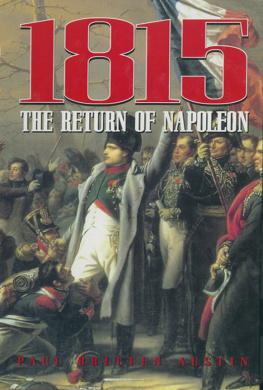TO THE READER.
The revolution of the 20th of March will form unquestionably the most remarkable episode in the life of Napoleon, so fertile as it is in supernatural events. It has not been my intention, to write the history of it: this noble task is above my powers: I have only attempted, to place Napoleon on the stage of action, and oppose his words, his deeds, and the truth, to the erroneous assertions of certain historians, the falsehoods of the spirit of party, and the insults of those timeserving writers, who are accustomed to insult in misfortune those, to whom they have subsequently paid court.
Hitherto people have not been able to agree on the motives and circumstances, that determined the Emperor, to quit the island of Elba. Some supposed, that he had acted of his own accord: others, that he had conspired with his partisans the downfal of the Bourbons . Both these suppositions are equally false. The world will learn with surprise, perhaps with admiration, that this astonishing revolution was the work of two individuals and a few words.
The narrative of Colonel Z***, so valuable from the facts it reveals, appears to me to merit the reader's attention in other respects. On studying it carefully, we find in it the exhibition of those defects, those qualities, those passions, which, confounded together, form the character, so full of contrasts, of the incomprehensible Napoleon. We perceive him alternatively mistrustful and communicative, ardent and reserved, enterprising and irresolute, vindictive and generous, favourable to liberty and despotic. But we see predominant above all, that activity, that strength, that ardour of mind, those brilliant inspirations, and those sudden resolves, that belong only to extraordinary men, to men of genius.
The conferences I had at Ble with the mysterious agent of Prince Metternich have remained to this day buried in profound secrecy. The historians, who have preceded me, relate, without any explanation, that the Duke of Otranto laid before the Emperor, at the moment of his abdication, a letter from M. de Metternich ; and that this letter, artfully worded, had determined Napoleon to abdicate, in the hope that the crown would devolve to his son. The particulars given in these Memoirs will entirely change the ideas formed of this letter, and of its influence. They confirm the opinion too, pretty generally prevalent, that the allied sovereigns deemed the restoration of the Bourbons of little importance, and would willingly have consented, to place the young Prince Napoleon on the throne.
It had been supposed, that the famous decree, by which Prince de Talleyrand and his illustrious accomplices were sent before the courts of justice, was issued at Lyons in the first burst of a fit of vengeance. It will be seen, that it was the result of a plan simply political: and the noble resistance, which General Bertrand (now labouring under a sentence of death) thought it his duty to oppose to this measure, will add, if it be possible, to the high esteem, merited on so many accounts by this faithful friend to the unfortunate.
The writings published previously to this work, equally contain nothing but inaccurate or fabulous reports, with regard to the abdication of Napoleon. Certain historians have been pleased, to represent Napoleon in a pitious state of despondency: others have depicted him as the sport of the threats of M. Regnault St. Jean d'Angely , and of the artifices of the Duke of Otranto. These Memoirs will show, that Napoleon, far from having fallen into a state of weakness, that would no longer permit him to wield the sceptre, aspired, on the contrary, to be invested with a temporary dictatorship, and that, when he consented to abdicate, it was because the energetic attitude of the representatives disconcerted him, and he yielded to the fear of adding the calamities of a civil war to the disasters of a foreign invasion.
It was perfectly unknown too, that Napoleon was detained a prisoner at Malmaison after his abdication. It was presumed, that he deferred his departure, in the hope of being replaced at the head of the army and of the government. These Memoirs will show, that this hope, if it dwelt within the breast of Napoleon, was not the real motive of his stay in France; and that he was detained there by the committee of government, till the moment when, honour outweighing all political considerations, it obliged Napoleon to depart, to prevent his falling into the hands of Blucher .
The negotiations and conferences of the French plenipotentiaries with the enemy's generals; the proceedings of the Prince of Eckmuhl ; the intrigues of the Duke of Otranto; the efforts of those members of the committee, who remained faithful to their trust; the debates on the capitulation of Paris, and all the collateral facts, connected with these different circumstances, had been totally misrepresented; These Memoirs establish or unfold the truth. They bring to light the conduct of those members of the committee, who were supposed to be the dupes or accomplices of Fouch ; and that of the marshals, the army, and the chambers. They contain also the correspondence of the plenipotentiaries, and the instructions given to them; documents hitherto unpublished, which will make known, what the politics and wishes of the government of France at that time were.
Finally I shall observe, in order to complete the account I think it right to give the reader of the substance of this work, that it furnishes elucidations of the campaign of 1815, the want of which has been imperiously felt. The causes, that determined Napoleon, to separate from his army at Laon , were not known: I point them out. General Gourgaud , in his narrative, could give no explanation of the march of the corps of Count Erlon at the battle of Ligny , of the conduct of Marshal Ney on the 16th, of the inactivity of Napoleon on the 17th, &c. All these points, I believe, I have elucidated. I show also, that it was not, as General Gourgaud and other writers assert, to raise the spirits, and excite the courage of the French army, that its leader announced to it the arrival of Marshal Grouchy . It is a certain fact, that Napoleon was himself deceived by a brisk firing, which took place between the Prussians and Saxons; and it is falsely, that he has been charged with having knowingly deceived his soldiers, at a moment when the laws of war and of humanity presented to him, to think rather of a retreat, than of continuing the battle.
I had at first rejected from these Memoirs such official papers, as had already been made known: but have since thought, that they ought to be inserted. This work, which embraces all the events of the reign of a Hundred Days, would be imperfect, if the reader were obliged to refer to the papers of the day; to read or consult the act of the congress of Vienna, that placed the Emperor Napoleon out of the pale of the law of nations; the Additional Act, which occasioned his loss of popularity; and the eloquent speeches and nervous declarations by which Napoleon, his ministers, and his counsellors, sought to explain and justify the 20th of March. I have thought, besides, that perhaps the reader would not find it uninteresting, to witness the contests exhibited, at that important period, between the legitimacy of nations and the legitimacy of sovereigns.









